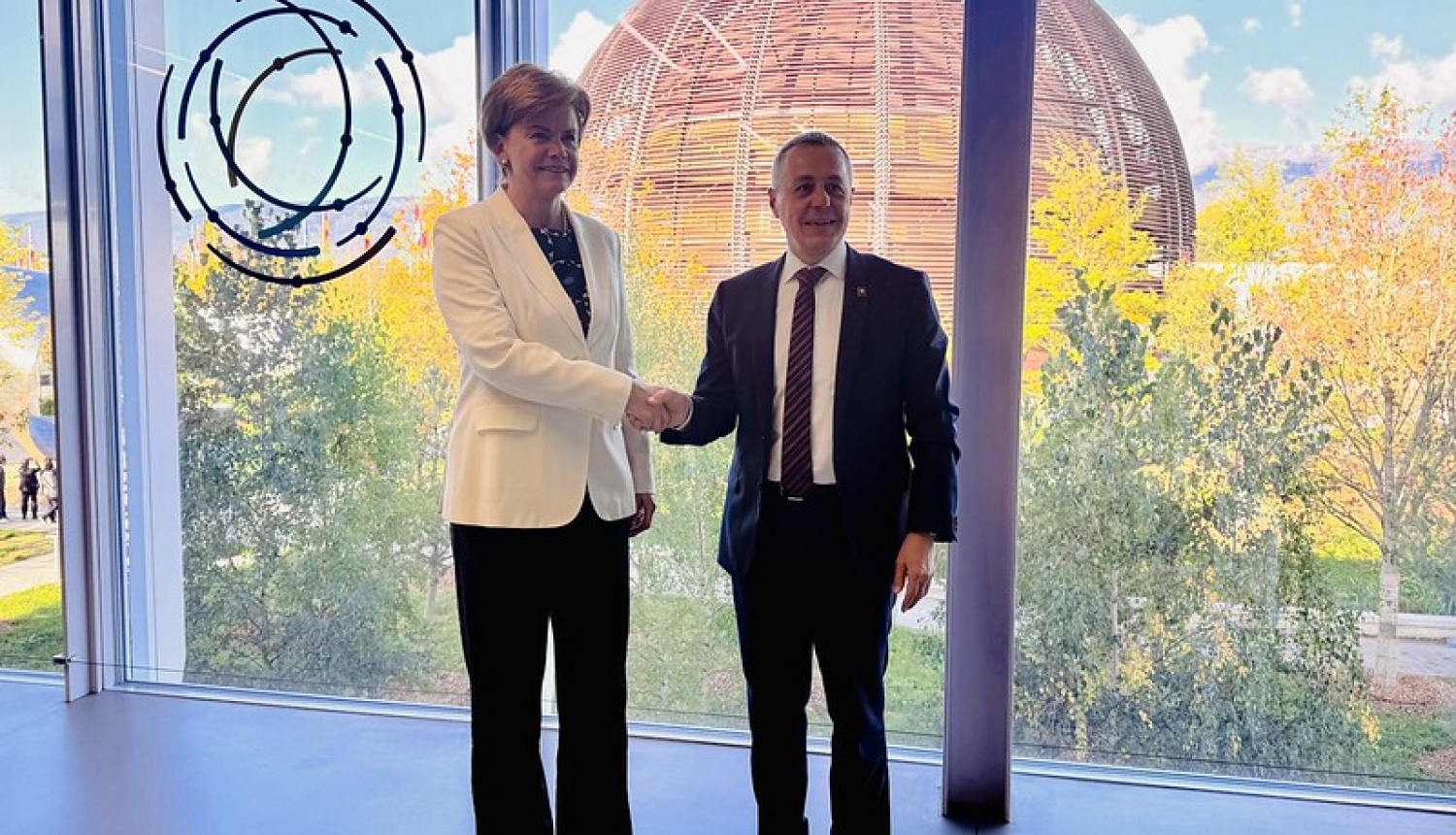On 10 and 11 October 2024, while on a working visit in Geneva, Switzerland, the Minister of Foreign Affairs, Baiba Braže, meet with the Federal Councillor, Head of the Federal Department of Foreign Affairs of Switzerland, Ignazio Cassis, and addressed audiences at the Geneva Science and Diplomacy Anticipation Summit (GESDA).
In a conversation with her Swiss counterpart, Baiba Braže exchanged views on the active political dialogue and bilateral cooperation between Latvia and Switzerland. The Latvian Foreign Minister welcomed the Latvian-Swiss Cooperation Programme for 2019–2029, highlighting in particular the launch of the “Advancement of paediatric cancer care” programme at the Latvian Children’s Hospital this past 2 October. For their part, 18 Latvian scientists are currently working at the European Organization for Nuclear Research (Conseil Européen pour la Recherche Nucléaire, CERN) with headquarters in Geneva. Work is underway for Latvia to become a full member of CERN.
As regards Ukraine, the Ministers were unanimous – in order to support Ukraine, we must continue to act decisively.
“With my Swiss colleage we discussed the ways to cooperate closer in order to achieve a lasting and just peace in Ukraine based on the United Nations Charter,” Baiba Braže underlined.
In a discussion on topics of international relevance, Foreign Minister Baiba Braže thanked Switzerland for its support to Ukraine including by organizing the first Summit on Peace in Ukraine.
In the context of Latvia’s candidacy for the UN Security Council membership in 2026–2027, Baiba Braže voiced Latvia’s interest in Switzerland’s expereince as a member of the UN Security Council for the 2023–2024 term. The Minister also congratulated Switzerland on its recent election to the UN Human Rights Council.
As part of her visit, Baiba Braže joined a discussion at the Geneva Science and Diplomacy Anticipation Summit on how to better anticipate and prepare for future challenges given the accelerated development of science and technologies. In a high-level panel together with delegates from Switzerland, India, Poland, and El Salvador, Baiba Braže underlined the need for research, business and political communities to collaborate in their home countries and at the international level, pooling best knowledge and the practice of its implementation.
“Advances in science need to be shared with the broader public. Communication is key in the commercialisation and export of science, so that there would be mutual understanding between the academic community and entrepreneurs. It is also important for formulating evidence-based policies. When it comes to investing in future technologies, we must be able to make bold decisions,” Baiba Braže said at the conference.
She also underlined that “we – Latvia – lead the world in quantum technology development, as well as in the advancement of 5G and 6G. It is also noteworthy that Latvia stands out among EU countries with a comparatively high share of women in science”.
In a meeting with Latvians working in Geneva, Baiba Braže thanked them for preserving their Latvian identity in a foreign country and urged them to share their knowledge and expereince as a contribution to Latvia’s economic development.
The Foreign Minister also gave an interview to a Swiss newspaper, Der Tages-Anzeiger.
Candidacy of Latvia for the UN Security Council (2026–2027)
Latvia is standing as candidate for the UN Security Council for the term of 2026–2027. The objective is to keep the focus of the UN Security Council on the issues of highest importance to our region – supporting Ukraine, strengthening international law, eradicating sexual violence in conflicts, cybersecurity, AI, and countering disinformation. Latvia is doing its utmost to restrict the election of Russian and Belarusian representatives to UN bodies and forums. The UN Security Council has 15 members, five of them being permanent members.





